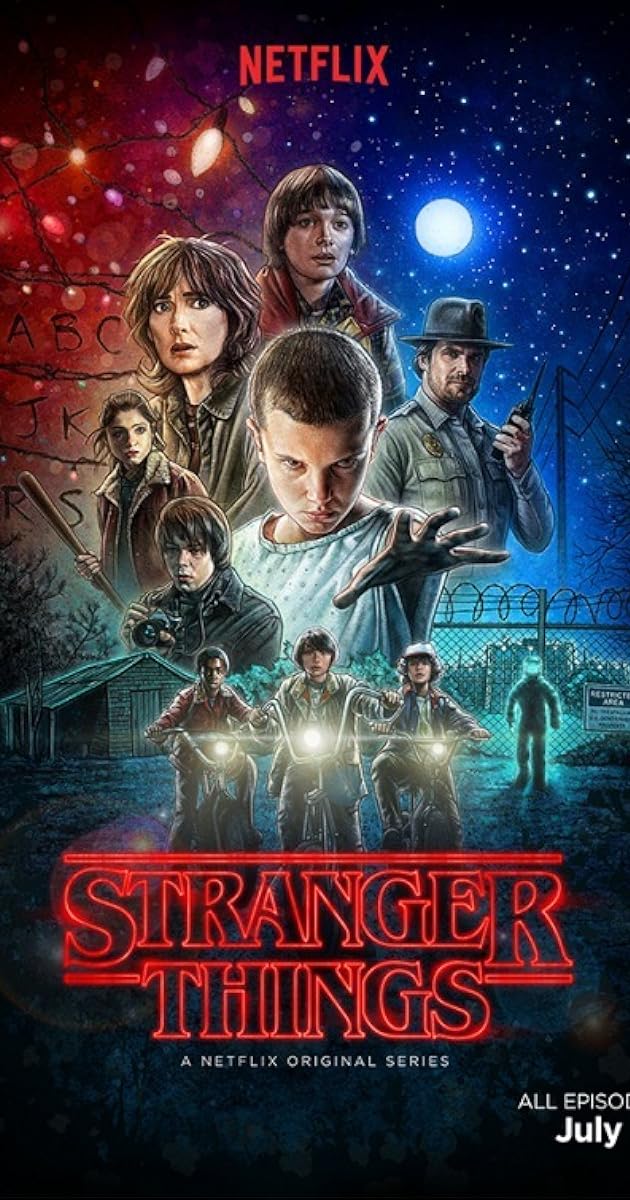Stranger Things is a recent Netflix Original series that blew up in popularity. The show contains elements of mystery and sci-fi, and takes place in 1990’s Indiana. The television show seems to have an interesting relationship with modern gender roles. The main trio of boys searching for their friend Will have these stereotypes pushed onto them, but fail to follow. They play Dungeons and Dragons, get scared easily by almost everything, and end up making Eleven do most of the dangerous activities. Teenager Nancy is stuck between two boys, Jonathan (Will’s brother) and Steve. Yet as the story progresses she ends up firing a gun and showing more bravery than both the boys combined. In only eight episodes, Stranger Things promotes the individuality and power of women through its complex characters while also showing how society attempts to shut these females down.
The children of the story are arguably the protagonists. Three of Will’s friends, Mike, Dustin, and Lucas, leave the hard and dangerous work of finding Will to a young girl named Eleven. Although tormented and abused to gain these abilities as a child, Eleven is intelligent and exact with her telekinetic powers. Without spoiling the show, there are many instances in which clues are found and lives are saved all because of her. Overtime the storyline begins to paint her as Mike (the leader of the group)‘s love interest. But when analyzing her it’s clear she’s not doing all of this necessarily for Mike, she’s doing it because she cares and wants no one to go through what she has.
The teenagers of the story are sadly very cliche. Nancy is the older sister of Mike, and Jonathan is the older brother of Will. Steve is Nancy’s current boyfriend, who causes her to neglect her best friend Barb in order to be popular. Through helping out their siblings in any way they can, Nancy and Jonathan start develop a romance. But this does not get in the way of Nancy’s determination to help her younger brother, as she travels to different dimensions and fires a gun all on her own. And in the end of the season, despite the clear opposition most of the audience felt, Nancy dated the guy she wanted to. Her only downfall as a character is neglecting her best friend Barb, which causes this ginger sidekick to get involved in the disappearance of Will.
The adults of the story seem to, quite frankly, be the laziest until the last couple episodes. One of the questionable female of the show is Will’s mother Joyce. She goes into hysterics when Will goes missing, frantically begging Chief Hopper of the police to devote his work to searching. Over the course of the show, the debate arises on whether or not Joyce in mentally sane. She keeps claiming to be receiving messages or calls for help from Will throughout her home, through christmas lights or telephones. Society, like Hopper, see this behavior as pure craziness and just a symptom of a grieving mother. Yet this remains a mystery, as season one concluded with no real answer to how much Joyce saw was reality.
In the society of Stranger Things females lack agency in how they appear how they act, etc. But the strongest leads are women who fight for their agency and basically do whatever they want no matter what they’re told. On the one hand, we have the powerful telekinetic girl Eleven, who directs majority of the plot and fits none of the womanly spheres. On the other hand, another featured female Nancy seems fierce, but is continually having to ‘decide’ between two male love interests. Yet the only visible stereotype is the mother figure Joyce but even she stands up for herself and her own (possibly insane) ideals. Almost all the females in the story are told at some point that they’re crazy, that they’re wrong and should listen to what the men have to say. In some of these cases it’s reasonable, as the female’s action may harm other. But nevertheless there is definitely evidence of “mansplaining” in the young boys and grown men of the show.
Stranger Things barely passes the Bechdel Test, but this does not mean it doesn’t promote feminism. The main conflict of the series is the disappearance of a young boy named Will. Therefore, most conversations between any of the characters are about Will. The only small incidence that passes the Bechdel Test is when Nancy asks a random side character named Mia if she’s seen Barb today. This counts because Mia’s name is mention seconds before, so she is a named character. But this still barely counts, and the entire gaze of the show is still on Will.
The hit Netflix Original Series didn’t get it’s fame for being radically progressive with its badass females. They just added to the intriguing storyline and attracted a stronger female audience as they saw themselves in Eleven, Nancy, or Joyce. This kind of work, shows that highlight feminist ideals but isn’t centered on them, is becoming more popular in movies and television. In order to shine light on an oppressing situation, a fictional representation can be created to real in the audience to the reality of it.


No comments:
Post a Comment
Note: Only a member of this blog may post a comment.